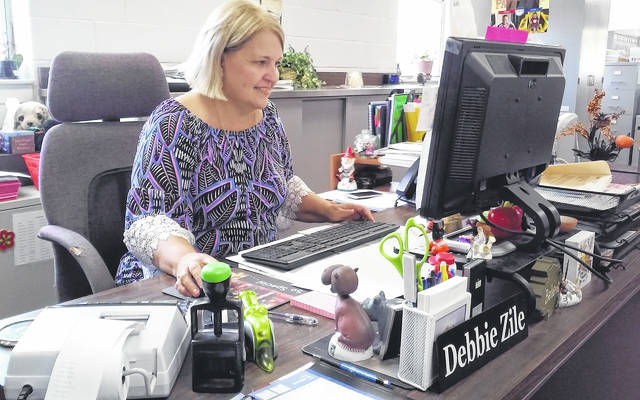
October is designated Breast Cancer Awareness Month around the country, and many Highland County residents have been affected by the disease — including Debbie Zile, who was diagnosed in 2005 after a routine mammogram revealed something wasn’t right.
“I had no sign that anything was wrong,” she told the Times-Gazette. “The only thing that saved me was the mammogram, and I’ve always had mammograms regularly and I’m glad I did because there were no symptoms and no pain, in fact, I really didn’t even feel a lump or anything.”
Zile, who works at the Highland County Auditor’s Office, is married to Tom Zile, the pastor of the Hillsboro Church of the Nazarene. Her journey with breast cancer began in 2005 with the thought, “Why me, Lord?”
Eight months prior to Debbie Zile’s diagnosis, her son was killed in an accident.
“If it hadn’t been for losing Justin, I think being told I had breast cancer would’ve been harder to handle, since I had just gone through one of the worst things you can deal with,” she said.
Zile remembered being home alone in the evening when her doctor called and confirmed her worst fears. When her husband returned home, she said she asked him, “Tom, why us?”
“His answer to me was ‘Debbie, why not us?’ If it were not for my faith and that God had sustained me through the loss of my son, and then through six surgeries for the cancer, I couldn’t have gotten through any of it without his help,” she said.
Back in 1975, NBC news correspondent Betty Rollin was diagnosed and a year later, she wrote a book about her battle with breast cancer.
She entitled it “First, You Cry,” because she said that describes any woman’s first reaction to being told they had the disease.
That was 43 years ago, and the good news from the American Cancer Society today is that survival rates are higher and there are more treatment options available. However, the organization stresses the importance of mammograms for early detection. The ACS recommends all women over the age of 40 get regular mammograms.
Despite the availability of earlier detection techniques, more effective treatment and better patient outcomes, the statistics are sobering, according to Sharon Hibbs of Buford, who owned Design One salon for 26 years, and found herself diagnosed with breast cancer.
“Breast cancer is no respecter of persons and takes no prisoners,” she said.
Hibbs, who is somewhat of a local authority on breast cancer, said that every year, 250,000 women are diagnosed with breast cancer, and 40,000 die.
Hibbs also said 16,000 men last year were told they had breast cancer and 2,000 of them died from it.
Hibbs believes one of the reasons she got breast cancer was so she could spread the word about the importance of early diagnosis by mammogram.
“When I began to talk with the many women I came into contact with through my business, it caused women who were older than 40 who had never had a mammogram to go get one,” she said.
Like Zile, Hibbs had no indication anything was wrong until the mammogram showed otherwise.
“Everyone thinks you have to find a lump in the breast,” she said. “In my case, there was no lump, since mine was ductal carcinoma, or cancer of the milk ducts.”
Hibbs followed the ACS recommendation regarding mammograms, and at 48 years of age, doctors noticed a change from previous years.
“Women should get their mammograms at the same place every year,” she said, “or if they change places, they need to go get their records so you can take them to the place you’re currently getting examined.”
Doctors performed a surgical biopsy on Hibbs, which she described as “a little bit more than a lumpectomy.” The procedure resulted in her losing more than one third of her breast.
“They later discovered they didn’t get what’s called ‘clear margins,’” she said.
Hibbs explained that “clear margins” is a medical term that indicates to a surgeon whether or not all of the cancer was removed. In Hibbs’ case, surgeons discovered they didn’t get all of the cancer, and told Hibbs that she would have to undergo a mastectomy.
“If I didn’t go through the surgery, I was facing having to have a mammogram every six months for the next five years,” she said.
Hibbs was told she would also have to begin taking a drug called Tomoxifin to reduce the chances of cancer in the other breast. But, Hibbs said, “Studies have shown 15 percent of women who use that drug wind up with uterine cancer.”
Both women said they decided to take the surgical solution and “just get rid of it.”
“In my mind, there was no way I was going to struggle with chemo and radiation therapy,” Zile said. “So I decided to have the mastectomy and, like I said, told my doctor to just get rid of it.”
Today, both women are cancer-free, but share a common bond that the late actress Gilda Radner described as having “membership to an elite club I’d rather not belong to.”
“When it comes to cancer, time is the only friend you have,” Hibbs said. “If you catch it early enough, regardless if you’re a man or woman and regardless of the type, doctors can probably fix it, and even though in my case it could come back, it’s a small percentage of risk.”
Hibbs and Zile, both women of faith, encourage any man or woman facing cancer to not begin the journey alone.
“A walk with Jesus gives you hope,” Zile said. “I knew that God had brought me through so much that He wasn’t going to take me this far and just drop me… if you want hope, read Jeremiah 29:11 sometime.”
Reach Tim Colliver at 937-402-2571.


